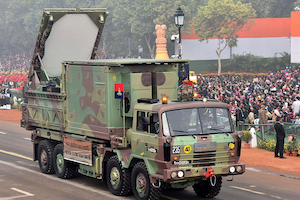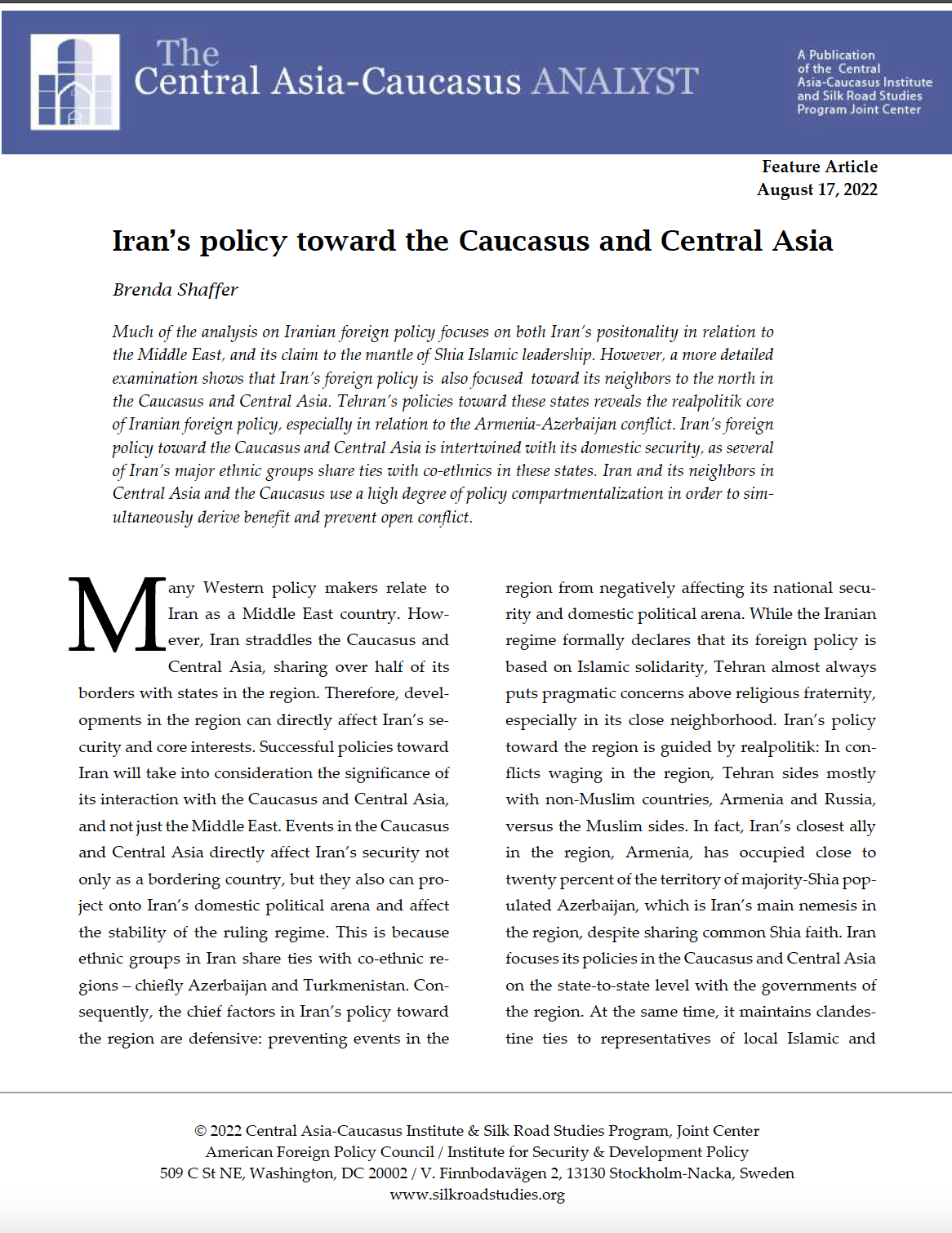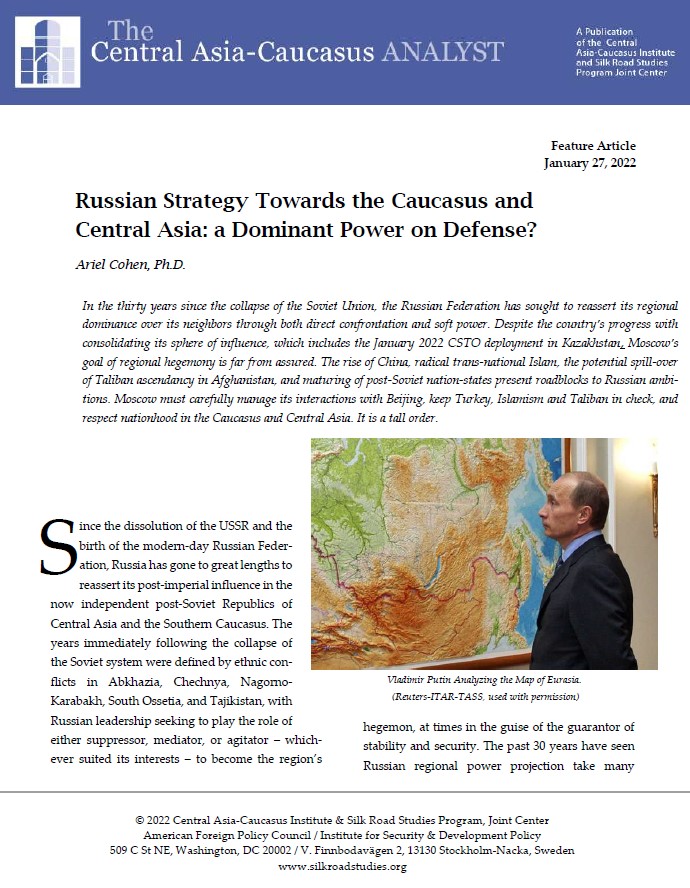Russia's Weakened Influence in Central Asia and the Caucasus
By Alexander Yeo and Emil Souleimanov
July 6, 2023
Russia has long been a regional hegemon, able to actively exert hard and soft power over many of its neighbors, the Central Asian and South Caucasian states among them. However, since the start of Russia’s full-scale invasion of Ukraine, this influence has weakened, with military and economic resources being diverted to an increasingly protracted and unpredictable war effort. This has led to a shift in regional power balances, as showcased by Azerbaijan’s ascendancy in the South Caucasus, as well as economic challenges including the difficult choices faced by the allies of an increasingly isolated Russia.
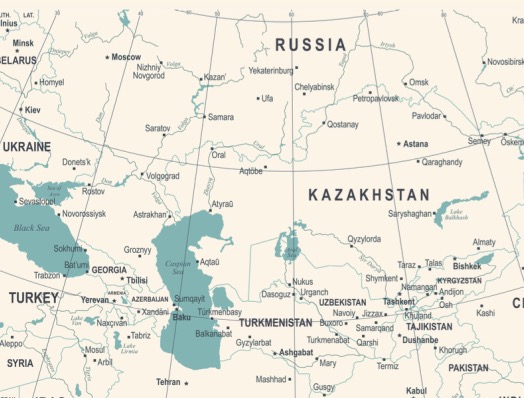
Iran’s policy toward the Caucasus and Central Asia
By Brenda Shaffer
August 17, 2022
Much of the analysis on Iranian foreign policy focuses on both Iran’s positonality in relation to the Middle East, and its claim to the mantle of Shia Islamic leadership. However, a more detailed examination shows that Iran’s foreign policy is also focused toward its neighbors to the north in the Caucasus and Central Asia. Tehran’s policies toward these states reveals the realpolitik core of Iranian foreign policy, especially in relation to the Armenia-Azerbaijan conflict. Iran’s foreign policy toward the Caucasus and Central Asia is intertwined with its domestic security, as several of Iran’s major ethnic groups share ties with co-ethnics in these states. Iran and its neighbors in Central Asia and the Caucasus use a high degree of policy compartmentalization in order to simultaneously derive benefit and prevent open conflict.
Russian Strategy Towards the Caucasus and Central Asia: a Dominant Power on Defense?
Russian Strategy towards the Caucasus and Central Asia: A Dominant Power on Defense?
By: Ariel Cohen, Ph.D.
In the thirty years since the collapse of the Soviet Union, the Russian Federation has sought to reassert its regional dominance over its neighbors through both direct confrontation and soft power. Despite the country’s progress with consolidating its sphere of influence, which includes the January 2022 CSTO deployment in Kazakhstan, Moscow’s goal of regional hegemony is far from assured. The rise of China, radical trans-national Islam, the potential spill-over of Taliban ascendancy in Afghanistan, and maturing of post-Soviet nation-states present roadblocks to Russian ambitions. Moscow must carefully manage its interactions with Beijing, keep Turkey, Islamism and Taliban in check, and respect nationhood in the Caucasus and Central Asia. It is a tall order.
Since the dissolution of the USSR and the birth of the modern-day Russian Federation, Russia has gone to great lengths to reassert its post-imperial influence in the now independent post-Soviet Republics of Central Asia and the Southern Caucasus. The years immediately following the collapse of the Soviet system were defined by ethnic conflicts in Abkhazia, Chechnya, Nagorno-Karabakh, South Ossetia, and Tajikistan, with Russian leadership seeking to play the role of either suppressor, mediator, or agitator – whichever suited its interests – to become the region’s hegemon, at times in the guise of the guarantor of stability and security.
A Steadily Tightening Embrace: China’s Ascent in Central Asia and the Caucasus
A Steadily Tightening Embrace: China’s Ascent in Central Asia and the Caucasus
By: Raffaello Pantucci
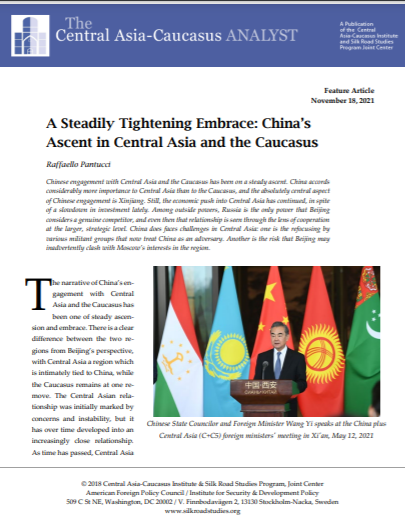 Chinese engagement with Central Asia and the Caucasus has been on a steady ascent.China accords considerably more importance to Central Asia than to the Caucasus, and theabsolutely central aspect of Chinese engagement is Xinjiang. Still, the economic push intoCentral Asia has continued, in spite of a slowdown in investment lately. Among outsidepowers, Russia is the only power that Beijing considers a genuine competitor, and even then that relationship is seen through the lens of cooperation at the larger, strategic level. China does faces challenges in Central Asia: one is the refocusing by various militant groups that now treat China as an adversary. Another is the risk that Beijing may inadvertently clash with Moscow’s interests in the region.
Chinese engagement with Central Asia and the Caucasus has been on a steady ascent.China accords considerably more importance to Central Asia than to the Caucasus, and theabsolutely central aspect of Chinese engagement is Xinjiang. Still, the economic push intoCentral Asia has continued, in spite of a slowdown in investment lately. Among outsidepowers, Russia is the only power that Beijing considers a genuine competitor, and even then that relationship is seen through the lens of cooperation at the larger, strategic level. China does faces challenges in Central Asia: one is the refocusing by various militant groups that now treat China as an adversary. Another is the risk that Beijing may inadvertently clash with Moscow’s interests in the region.
India Wins Defense Deal with Armenia
By Fuad Shahbazov
June 1, 2020, the CACI Analyst
On March 1, 2020, India outperformed Russia and Poland in a US$ 40 million defense deal with Armenia to supply it with four domestically made SWATHI counter-battery radars. The system is developed by India’s Defence Research and Development Organization (DRDO) and manufactured by Bharat Electronics Limited (BEL). It provides accurate information on enemy artillery firing positions weapons up to 75 kilometers away. The decision came amid India’s growing efforts to boost its national “Make in India” brand in the defense industry sector, which could make new inroads into European, Middle Eastern and Asian defense markets. However, the new Indian – Armenian defense deal could undermine Delhi’s relations with Russia on the one hand, and Azerbaijan, Turkey and Pakistan on the other.
